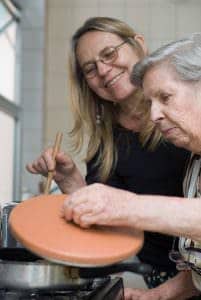Find out how care at home can help you if you are struggling with mobility issues, aiding your independence and much more.
According to a study in the media last year, by 2047, 1 in 5 women, and 1 in 6 men aged over 65 will suffer from physical disabilities. Many different mobility issues can affect a person in their later years and those mobility problems can limit a person’s ability to perform daily tasks in and out of the home. Even simply getting older can be a cause of reduced mobility in some, which can cause the same daily restrictions in the ability to complete day-to-day tasks.
For those suffering from reduced mobility, day-to-day living can become a real challenge. Personal tasks like washing and going to the toilet may become difficult. Getting out to do shopping or to run errands like picking up medication may also become difficult so it can be very easy to quickly become isolated.
If you are struggling with mobility issues, it might be time to think about elderly care options available to you.
Physical Disabilities Associated With Old Age
As we age, our strength and energy levels will naturally reduce. If restricted mobility is also a factor then the challenges are much greater. The problems surrounding struggling with mobility can of course vary hugely in people of the same age, with some people being relatively active and others reliant on aids to stay mobile. Some people may even find they are restricted to a wheelchair, or even to their bed.
It becomes a major concern when cooking, cleaning, personal care and loneliness all become problems as a consequence. Sometimes family and friends may notice before you are willing to admit it, because naturally, most of us fight to retain our independence, especially if we think loss of mobility will inevitably mean ending up in a care home.
But that isn’t the only option – admitting you need help doesn’t mean you have to leave your own home or giving up the independence you do have. It doesn’t mean you have to go into an elderly care home. There are other care options out there for you, which can help you in your home, but the first step is admitting that you need help.
Live-in Care
In-home care or live-in care, although popular, is still a relatively unknown part of the care system here in the UK. One reason for this may be the assumption that it is unaffordable for most, yet it is actually comparable to the cost of a care home place. So it can be a viable choice for many people.
It is also important that you understand what financial help you are entitled to, especially since another recent media report highlighted how people in receipt of PIP (Personal Independence Payment) were unaware that they needed to fill in a new form to get their full allowance. Having your own carer close at hand who knows all about the latest developments with regard to both good caring practise and the practical aspects such as benefits payments, could avoid such an issue arising.
How A Live-in Carer Can Help
Home care is an excellent choice for elderly people struggling with mobility issues because you get the help you need, as and when you need it, without having to move away from the place you love the most.
Your carer will do as little or as much as you want them to. They can provide help with personal care, household tasks, pet care and can even accompany you on hospital and GP visits. Your care plan is tailor-made to suit your needs, including helping you be as mobile as possible, and helping you be as independent as possible.






11 Comments. Leave new
Great advice. thank you!
Live in care is such an excellent choice! Great article!
A very interesting article. Something that a neighbour had problems with last year – he couldn’t get about so much but wasn’t ready to be packed off to a care home – live in and his family staying a lot more solved that for him
Thanks Pete – That’s a good point you make about not being ready to be “packed off to a care home” – in my experience there are plenty of people in care homes who could have managed at home with the right help and support. Another reason why it’s so important to investigate care options in advance and for people to make their wishes known so that a decision isn’t made in a rush or during a crisis.
Live-in care is entirely bespoke – helping you stay mobile and as independent as possible in the comfort of your own home!
Really useful advice, thank you.
Great post – thank you for sharing!
I wish I knew about live in care a few years ago! I’ll be recommending to friends for their parents for sure.
We are working hard to raise awareness of live-in care because there are still people who don’t know it’s an option for them, and it’s so sad to think that people are going in to care homes thinking they have no other choice.
My father was diagnosed with a degenerative condition and as his mobility gradually worsened and my mother was no longer able to cope with him by herself, we took the decision to have live-in care. During this time our live-in carers and my mother worked with the OT who was able to recommend (and source the majority of the time) aids that would help his mobility, whilst enabling him to stay at home with my mum and all that was familiar to him. With live-in care he was able to stay at home until just days before he sadly passed away.
Very informative read – thank you